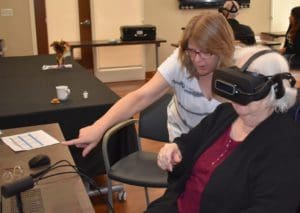8 Expert Tips for Successful Dementia Caregiving
 When forgetfulness becomes more frequent and other aspects of a loved one’s day-to-day life start becoming more challenging, it is hard to know where to turn. While chronic memory impairments like Alzheimer’s disease and vascular dementia typically take months or even years to progress—with symptoms possibly remaining hidden from the people closest to them—the changes that come once a problem has been identified can feel sudden and severe.
When forgetfulness becomes more frequent and other aspects of a loved one’s day-to-day life start becoming more challenging, it is hard to know where to turn. While chronic memory impairments like Alzheimer’s disease and vascular dementia typically take months or even years to progress—with symptoms possibly remaining hidden from the people closest to them—the changes that come once a problem has been identified can feel sudden and severe.
What comes next is critical to the quality of life of the person now living with dementia, the people who love them, and those who will offer support and provide care for them in the future. Regardless of whether you have an official diagnosis, it is important to take the necessary steps to address the current and future needs of your loved one.
Whether or not you realize it, you are now a caregiver. The tips outlined below from experts involved in a recent program hosted at St. John’s will help you better navigate the challenges of dementia and make your experience as a caregiver more fulfilling.
Educate Yourself
Family caregivers who are just starting out should take time to learn more about what to expect as the disease progresses. Experts feel strongly that caregivers should make an effort to educate themselves and determine next steps. This is something that can be difficult considering an often unknown future.
“Gather as much information as you can,” advises Alyssa Ferrigno, geriatric care manager with Care Consultants of Rochester. “Make sure you get sage advice from doctors, lawyers, and care managers and other professionals who can assist you.”
Make a Plan
The ultimate goal should be for caregivers to develop a plan that includes contingencies for both immediate and future care needs. This plan should also include input from your loved one who is facing the disease. “We need to be very mindful of getting the person with dementia involved in creating a plan in those early stages,” recommends Ferrigno.
Dr. Dallas Nelson, medical director of the UR Medicine Geriatrics Group, agrees about the importance of involving the person living with dementia early on in discussions and decision-making. “It’s really a value system on how you want to live out your life,” she says, of allowing a person to retain some control over how they are supported.
Put the Plan in Writing
A plan is not an official plan until it is put into writing. Advance directives are documents that ensure that a person’s wishes are carried out as intended and should be a priority. At the top of the list is the completion of a Durable Power of Attorney, which allows for the person to install a trusted agent (or multiple agents) to manage their financial matters in the event that they are unable to do so themselves.
 “As long as you can continue to make decisions for yourself, you are in the driver’s seat in regards to your medical care,” explains R. Thompson Gilman, a partner at Woods Oviatt Gilman LLP. “Once you lose the ability to make decisions for yourself, it is very important to have a health care proxy in place.” As Gilman describes it, the health care proxy specifies that “if I can’t make decisions for myself, I appoint someone (usually a family member) to make decisions for me.” A separate document—known as a Living Will—often works hand in hand with the health care proxy and spells out specific, personal health care wishes.
“As long as you can continue to make decisions for yourself, you are in the driver’s seat in regards to your medical care,” explains R. Thompson Gilman, a partner at Woods Oviatt Gilman LLP. “Once you lose the ability to make decisions for yourself, it is very important to have a health care proxy in place.” As Gilman describes it, the health care proxy specifies that “if I can’t make decisions for myself, I appoint someone (usually a family member) to make decisions for me.” A separate document—known as a Living Will—often works hand in hand with the health care proxy and spells out specific, personal health care wishes.
Gilman also recommends that caregivers ensure that their loved one complete the MOLST form, a New York State document typically prepared with the help of a physician. Dr. Nelson agrees about the importance of taking this additional step. “The MOLST form gives a great deal of power within the medical system, as these are agreed upon orders from your doctor that every person, including emergency services, must follow.”
Some people may also wish to complete and sign a “Do Not Resuscitate” order to prevent the use of extraordinary life-saving measures.
Consider a Specialist
If you are starting to see behaviors or unsafe decision-making by your loved one, it is best to schedule a visit with your loved one’s primary care physician immediately. From there, if his or her doctor is unable to make a specific determination on a probable diagnosis, they can refer to a specialist for a more thorough evaluation.
“There are physicians who specialize in the diagnosis of memory impairment,” explains Dr. Nelson. “They are good at—particularly with the confusing cases—sorting out what is going on.” Specialists use neuropsychiatric testing—a nuanced look at what is happening in a person’s brain—to make a more informed diagnosis. More complex diagnoses like Lewy Body disease or a dual diagnosis of dementia and depression can be better identified by seeing a specialist, putting caregivers on a path towards better supporting their loved one.
Build Your Support System
Dementia caregiving is difficult to sustain long-term as a one-person job. “Caregivers need to build their own support systems,” says St. John’s Dementia/Quality of Life Specialist Mimi DeVinney. Whether it is family and friends, a support group, or respite care providers, your plan must include other people to take on some of the burden of this 24/7 commitment. DeVinney suggests thinking about people you meet who have been through similar circumstances and identifying those who can help give you some time off if you need a break.
“You can’t possibly do full-time dementia care all by yourself,” adds Dr. Nelson. “You’re going to need help somewhere along the way.”
Emerging Technologies Can Help
Dr. Nelson recommends medication management systems to help caregivers ensure that prescriptions are taken properly. “Taking medications consistently can really bridge somebody from needing a higher level of care for a while,” she says, explaining that new technologies over the past decade or more have helped caregivers overcome the confusion that sets in when their loved one has multiple pills to take throughout the day.
Dr. Nelson also described a telemedicine program that was partially rolled out at St. John’s Meadows a few years ago as a research project. The program includes what she calls “urgent telemedicine evaluations for changing conditions in the home.” The outcome of this particular project—which paired doctors using telecommunications technology for remote health monitoring with patient access to doctor’s visits and testing in their apartments—was a 24% decrease in emergency room visits for patients with dementia. She insists telemedicine programs are not a replacement for seeing your doctor regularly, but they can be a great supplement to primary care. Unfortunately, insurers do not always pay for these services, so be sure check with your loved ones’ insurance provider to learn more about what is covered.
Balance Independence and Safety
 There comes a time over the course of any caregiving journey when safety and independence will eventually intersect. Ferrigno warns that it is common for a person living with dementia to emphasize remaining independent over concerns for their own safety. However, she insists that as a caregiver you must remain a voice of reason when dealing with your loved ones’ well-being at home. “Safety always trumps independence. This cannot be negotiable.”
There comes a time over the course of any caregiving journey when safety and independence will eventually intersect. Ferrigno warns that it is common for a person living with dementia to emphasize remaining independent over concerns for their own safety. However, she insists that as a caregiver you must remain a voice of reason when dealing with your loved ones’ well-being at home. “Safety always trumps independence. This cannot be negotiable.”
If and when the time comes to look at senior living communities or long-term care, it is important that your family’s choice for a new home can ensure the safety of residents living there, while allowing for as much autonomy as possible. You will also want to ask about the ways residents are able to maintain their own routines while continuing to take part in activities and hobbies that are meaningful to them.
Take Care of Yourself
At the beginning of the Solutions for Navigating the Challenges of Dementia panel event in October, moderator and St. John’s Resident Life Director Chantel Foster complimented the dozens of current and future caregivers in the audience for taking the time to do something meaningful to them. Whether it is attending a lecture or concert, exercising, or spending time with close friends, it is crucial for caregivers to continue to do things that bring them joy.
Dr. Nelson eloquently describes the importance of self-care for the dementia caregiver: “The system is only as strong as all of its parts. The person depending on you needs you to be healthy. Many people will sacrifice their health to this process, but that will shorten your ability to be an affective caregiver. So take care of yourself and ask for help.”
Additional Resources for Rochester, New York area caregivers:
The University of Rochester Memory Care program
Alzheimer’s Association of Rochester and the Finger Lakes
Lifespan of Greater Rochester caregiver resources
NYSCRC resources for caregivers
Rochester Regional caregiver support
Related Articles:
Can My Loved One with Dementia Live Alone?
